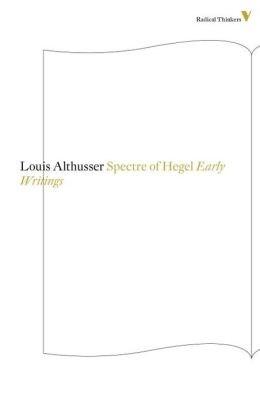The Spectre of Hegel: Early Writings | Louis Althusser

Detalii The Spectre of Hegel: Early
The Spectre of Hegel: Early - Disponibil la carturesti.ro
Pe YEO găsești The Spectre of Hegel: Early de la Verso Books, în categoria Carte straina.
Indiferent de nevoile tale, The Spectre of Hegel: Early Writings | Louis Althusser din categoria Carte straina îți poate aduce un echilibru perfect între calitate și preț, cu avantaje practice și moderne.
Caracteristici și Avantaje ale produsului The Spectre of Hegel: Early
- Departament: gaming-carti-birotica
- Ideal pentru pasionații de jocuri, birotică și distracție online.
Preț: 65 Lei
Caracteristicile produsului The Spectre of Hegel: Early
- Brand: Verso Books
- Categoria: Carte straina
- Magazin: carturesti.ro
- Ultima actualizare: 27-10-2025 01:24:43
Comandă The Spectre of Hegel: Early Online, Simplu și Rapid
Prin intermediul platformei YEO, poți comanda The Spectre of Hegel: Early de la carturesti.ro rapid și în siguranță. Bucură-te de o experiență de cumpărături online optimizată și descoperă cele mai bune oferte actualizate constant.
Descriere magazin:
Throughout the 1960s and 1970s, Louis Althusser enjoyed virtually unrivalled status as the foremost living Marxist philosopher. Today, he is remembered as the scourge and severest critic of \'humanist\' or Hegelian Marxism, as the proponent of rigorously scientific socialism, and as the theorist who posited a sharp rupture - an epistemological break - between the early and the late Marx. This collection of texts from the period 1945-1953 turns these interpretations of Althusser on their heads: we discover that there was a \'young Althusser\' as well as the \'mature Althusser\' we are already familiar with. In his fascinating Master\'s thesis. \'On Content in the Thought of G. W. F. Hegel\' (1947), Althusser developed a position which he was later to attack ferociously: namely, that the revolutionary potential of the Hegelian dialectic could be defended against Hegel\'s own political conservatism. We see Althusser still wrestling with the spectres of Hegel and of Catholicism in another long text, his letter to Jean Lacroix, and, finally, we see his own \'epistemological break\' in the piece \'On Marxism\' from 1953. Other texts included are his critique of Alexander Kojeve (whose interpretation Francis Fukuyama has recently revived) and his attack on the French Church\'s teachings on women, sex and the family. Widely recognized as an intellectual giant of the late twentieth century, Althusser has left a towering legacy. This collection not only gives a unique insight into the formation of such a personality, but will also restore the \'unknown Althusser\' to the centre of the history of Marxism and of philosophy since the Second World War.

Produse asemănătoare

Specter of the Past: Star Wars Legends (the Hand of Thrawn) - Timothy Zahn
![]() libris.ro
libris.ro
Actualizat in 28/10/2025
55.8 Lei

Transcultural Things and the Spectre of Orientalism in Early Modern Poland-Lithuania, Hardback/Tomasz Grusiecki
![]() elefant.ro
elefant.ro
Actualizat in 28/10/2025
613.99 Lei
Produse marca Verso Books

The Panthers Can\'t Save Us Now. Debating Left Politics and Black Lives Matter, Paperback/Cedric Johnson
![]() elefant.ro
elefant.ro
Actualizat in 28/10/2025
108.99 Lei

Cultures in Babylon. Feminism from Black Britain to African America, New ed, Paperback/Hazel V Carby
![]() elefant.ro
elefant.ro
Actualizat in 28/10/2025
129.99 Lei

Lean on Me. A Politics of Radical Care, Hardback/Lynne Segal
![]() elefant.ro
elefant.ro
Actualizat in 28/10/2025
129.99 Lei

Under the Banner of King Death. Pirates of the Atlantic, A Graphic Novel, Paperback/David Lester
![]() elefant.ro
elefant.ro
Actualizat in 28/10/2025
93.99 Lei

A Woman Called Moses: A Prophet for Our Time, Hardcover/Jean-Christophe Attias
![]() elefant.ro
elefant.ro
Actualizat in 28/10/2025
122.99 Lei




